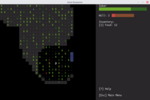The Biggest Ideas in the Universe by Sean Carroll
book, review
This review was originally posted at Goodreads and imported here later on with next to no spell/grammar checking.
5/5 stars
I find cosmology and quantum mechanics absolutely fascinating, but the books on the subject always had this problem: the ones targeted at the general audience always resort to flawed analogies and end up misleading you. And the rest is a scientific literature that requires a degree to be understood.
Nothing in between.
Nothing that is, until The Biggest Ideas came along.
The premise is simple: we’ll show you the equations, we’ll give you enough maths background to understand them and use them to illustrate the real concepts while still targeting a general-level audience.
You’ll need to sit down and think, but there’s no homework, no drudgery, no exams here. Just a desire to show you what’s really going on.
This book is the first part of a trilogy, covering the classical (i.e. non-quantum) physics. From Newton to Einstein’s General Relativity and black holes.
It is a dizzying, but glorious ride. It touches not only some of the most fundamental aspects of physics, but it’s peppered with fascinating historical anecdotes and goes into the philosophy of physics as well.
A lot of emphasis is put on the "spherical cow philosophy" — which gets its name from a joke but underlies a real and extremely successful approach to describing systems: start with the bare minimum you need, ignoring everything else (friction, gravity etc.) and come up with the equations.
More often than not, you can add all that stuff later to make it precise, but that initial model will be surprisingly precise, insightful and reliable. You can get a lot done this way.
I love that it dives into the special relativity without any fanfare. And indeed, the explanations put forward are much clearer than any I’ve read in the past. I mean, once you understand the equation for calculating the proper (i.e. measured by the observer) time in Minkowski space, everything else follows. Including that the universe has a speed limit.
I’ve not internalised the lessons fully yet, but I have a much better framework to think in and I can run though the equations again to solidify them better later on.
This is amazing.
The general relativity bits were much trickier. Touching matrices and geometry (my two weakest areas) and having been read in the late evening, exhausted after putting our one-year-old to sleep, I got much less out of them. But the insight of how to determine a curvature without embedding it in higher dimensions and the rough steps getting to the Einstein’s field equations from that — they resonated and stuck around.
And I’m much clearer on the principle of equivalence and why it’s such a huge deal.
Crucially, I now know all the mathematics involved in deriving the equations of general relativity and they’re not that much complex than the maths I know or used to know. So with some work, I’m confident I can get there.
So yes, if you’re not a-priori scared of equations and you’ve always wanted to understand what relativity was all about but couldn’t quite find the time to get a physics PhD, this is an excellent book.
The very last sentence in The Biggest Ideas reads: "Good times."
And that sums it up perfectly.
